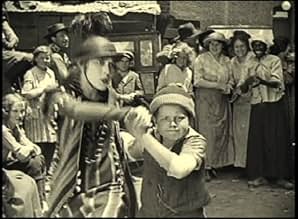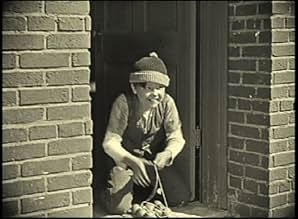IMDb RATING
6.6/10
1.1K
YOUR RATING
A spoiled young rich girl is forced by misfortune to fight for survival in the slums and alleys, where she becomes involved with all manner of unpleasantness.A spoiled young rich girl is forced by misfortune to fight for survival in the slums and alleys, where she becomes involved with all manner of unpleasantness.A spoiled young rich girl is forced by misfortune to fight for survival in the slums and alleys, where she becomes involved with all manner of unpleasantness.
T.D. Crittenden
- John Burke
- (as Dwight Crittendon)
Buddy Messinger
- Dish Lowry
- (as Buddie Messenger)
Ernest Butterworth Jr.
- Dish Lowry's Friend
- (uncredited)
Lafe McKee
- Board of Directors
- (uncredited)
- Director
- Writers
- All cast & crew
- Production, box office & more at IMDbPro
Featured review
It remains true that some of the greatest films ever made hail from the silent era; proliferate icon that she was, many of Mary Pickford's many films remain esteemed classics. Not all works of the time are equal, though, be it a matter of emphasis on outdated social values, different sensibilities of film-making or storytelling, or possibly just weak writing or direction generally, so even where Pickford is concerned one must sit to watch with high expectations while being prepared for a lesser experience. With all this in mind, I do think that 1919's 'The hoodlum' may be a title that doesn't perfectly hold up: in early scenes alone, some of the humor suggests cruelty to animals, and I earnestly question how some animals on set were treated; even for a flick in which a mean, haughty person will have a change of heart, there is initially a level of wickedness on display, that of the wealthy and powerful selfishly operating at will without care for anyone else, that is extra off-putting. Additional smidgens of those outdated social values, such as passing sexist remarks about women, don't specifically help to curry favor, and more substantively, there are points where the writing seems to take shortcuts that we can only take at face value, such as that early beat when protagonist Amy abruptly decides to change her plans, upsetting her grandfather.
Still, though there are odds and ends that don't come off so well in retrospect, there is much to appreciate in these eighty minutes. Even if the treatment and the scene writing can be rough, there is a sincere narrative with meaningful themes at the core as a pointedly unsympathetic person learns what's important in life and changes their ways. (And some scenes actually are very well done, moreover a credit to editor Edward McDermott.) The humor is often mild, and some scenes are all but cartoonish, with some tidbits that may even raise a skeptical eyebrow, but there is definitely fun to be had along the way, and this is a piece with heart that also happens to be reasonably entertaining. The acting and Sidney Franklin's direction may fall on the more forthright side of the spectrum - reflecting not the more subtle, natural performances that modern audiences are used to, and which would develop over time in the silent era, but the more exaggerated facial expressions and body language that were ported from the stage to compensate for lack of sound and verbal dialogue - but even at that the cast give spirited, capable performances, and Franklin ably keeps the proceedings fresh with just the right measure of pep and vitality. There are sure highlights throughout, such as a sequence in which Amy is caught in a rainstorm.
And when it comes to the nuts and bolts of the feature this is as well made as most any of its contemporaries. The costume design, hair, makeup, and especially the sets give us big eyefuls to take in, and they all look fantastic; where stunts, effects, and otherwise action come into play they are excellent. I admire the intertitles both for their writing - in particular, the lingo of one hundred years ago is itself a blast - and for the little artistic flourishes that often characterize them. The tinting that is exercised to help flavor scenes is as welcomingly sharp as McDermott's editing that shapes the picture. Nitpick some minutiae as we may, 'The hoodlum' is rather well-rounded overall, offering both amusement and rewarding thoughtfulness; though the sum total is no revelation, it's certainly far better than not. It's unlikely that this will do anything to change the minds of anyone who isn't already enamored of the silent era, but for those who enjoy what the early years of cinema have to offer, there's not truly any going wrong here. I might even say that while the pacing is a tad lethargic, the title picks up strength as it goes along, and the impression we're left with is stronger than the one we're first given; one can see, after all, the kinship that this shares with comedies from the likes of Charlie Chaplin or Buster Keaton, and that's high praise indeed. If early scenes left a bit to be desired, it was perhaps only in an effort to move more quickly to the best parts to come, and when all is said and done I can't really fault anyone for that.
So yes, the movie may have its issues. Yet ultimately it provides a good time while serving lessons about learning compassion and empathy - desperately needed one hundred years later - and discovering real community despite superficial differences, a notion which these days feels like a relic of the past, while imparting a complete, duly compelling story. Even at its best I wouldn't say that this demands to be seen, but warts and all, I'm very pleased with just how good 'The hoodlum' is, and I'm happy to give it my warm recommendation.
Still, though there are odds and ends that don't come off so well in retrospect, there is much to appreciate in these eighty minutes. Even if the treatment and the scene writing can be rough, there is a sincere narrative with meaningful themes at the core as a pointedly unsympathetic person learns what's important in life and changes their ways. (And some scenes actually are very well done, moreover a credit to editor Edward McDermott.) The humor is often mild, and some scenes are all but cartoonish, with some tidbits that may even raise a skeptical eyebrow, but there is definitely fun to be had along the way, and this is a piece with heart that also happens to be reasonably entertaining. The acting and Sidney Franklin's direction may fall on the more forthright side of the spectrum - reflecting not the more subtle, natural performances that modern audiences are used to, and which would develop over time in the silent era, but the more exaggerated facial expressions and body language that were ported from the stage to compensate for lack of sound and verbal dialogue - but even at that the cast give spirited, capable performances, and Franklin ably keeps the proceedings fresh with just the right measure of pep and vitality. There are sure highlights throughout, such as a sequence in which Amy is caught in a rainstorm.
And when it comes to the nuts and bolts of the feature this is as well made as most any of its contemporaries. The costume design, hair, makeup, and especially the sets give us big eyefuls to take in, and they all look fantastic; where stunts, effects, and otherwise action come into play they are excellent. I admire the intertitles both for their writing - in particular, the lingo of one hundred years ago is itself a blast - and for the little artistic flourishes that often characterize them. The tinting that is exercised to help flavor scenes is as welcomingly sharp as McDermott's editing that shapes the picture. Nitpick some minutiae as we may, 'The hoodlum' is rather well-rounded overall, offering both amusement and rewarding thoughtfulness; though the sum total is no revelation, it's certainly far better than not. It's unlikely that this will do anything to change the minds of anyone who isn't already enamored of the silent era, but for those who enjoy what the early years of cinema have to offer, there's not truly any going wrong here. I might even say that while the pacing is a tad lethargic, the title picks up strength as it goes along, and the impression we're left with is stronger than the one we're first given; one can see, after all, the kinship that this shares with comedies from the likes of Charlie Chaplin or Buster Keaton, and that's high praise indeed. If early scenes left a bit to be desired, it was perhaps only in an effort to move more quickly to the best parts to come, and when all is said and done I can't really fault anyone for that.
So yes, the movie may have its issues. Yet ultimately it provides a good time while serving lessons about learning compassion and empathy - desperately needed one hundred years later - and discovering real community despite superficial differences, a notion which these days feels like a relic of the past, while imparting a complete, duly compelling story. Even at its best I wouldn't say that this demands to be seen, but warts and all, I'm very pleased with just how good 'The hoodlum' is, and I'm happy to give it my warm recommendation.
- I_Ailurophile
- Jan 28, 2025
- Permalink
Storyline
Did you know
- TriviaThe film, released one year after the end of World War I, is proceeded by two short public service advertisements featuring Mary Pickford playing a schoolgirl. In the first she is writing on a school chalkboard that reads, in cursive, "Be an American help Uncle Sam pay for the War. The fighting is over but the paying aint." Someone offscreen is talking to her. She then adds the word "not" at the end. Then, after some additional prompting erases aint and adds "is". In the second public service announcement, she is again at the blackboard, writing in print "Buy WAR SAVINGS STAMP". Again, someone off camera prompts her and she adds a small "s" at the end. Then smiles and curtseys.
- ConnectionsFeatured in Mary Pickford: A Life on Film (1997)
- SoundtracksThe Hoodlum
Words by Sam Lewis (as Sam M. Lewis) & Joe Young; music by Harry Ruby, c. 1919
'Dedicated to Mary Pickford in "The Hoodlum" her second picture from her own studios, A First National Attraction'
Details
- Runtime1 hour 18 minutes
- Color
- Sound mix
- Aspect ratio
- 1.33 : 1
Contribute to this page
Suggest an edit or add missing content






























